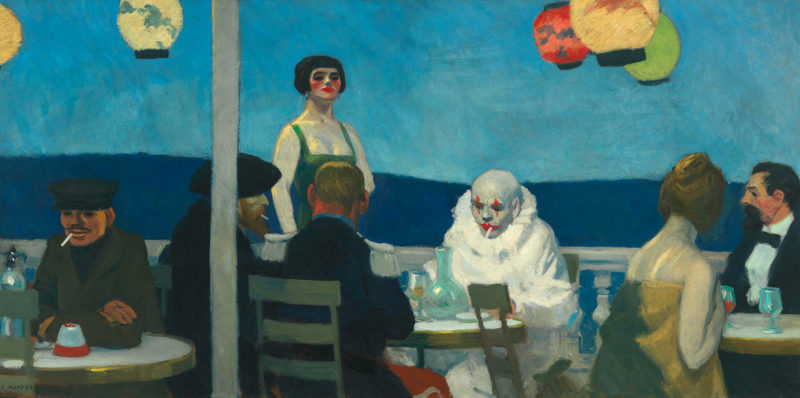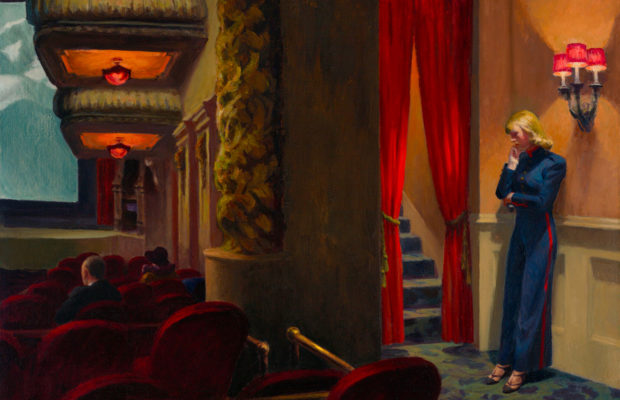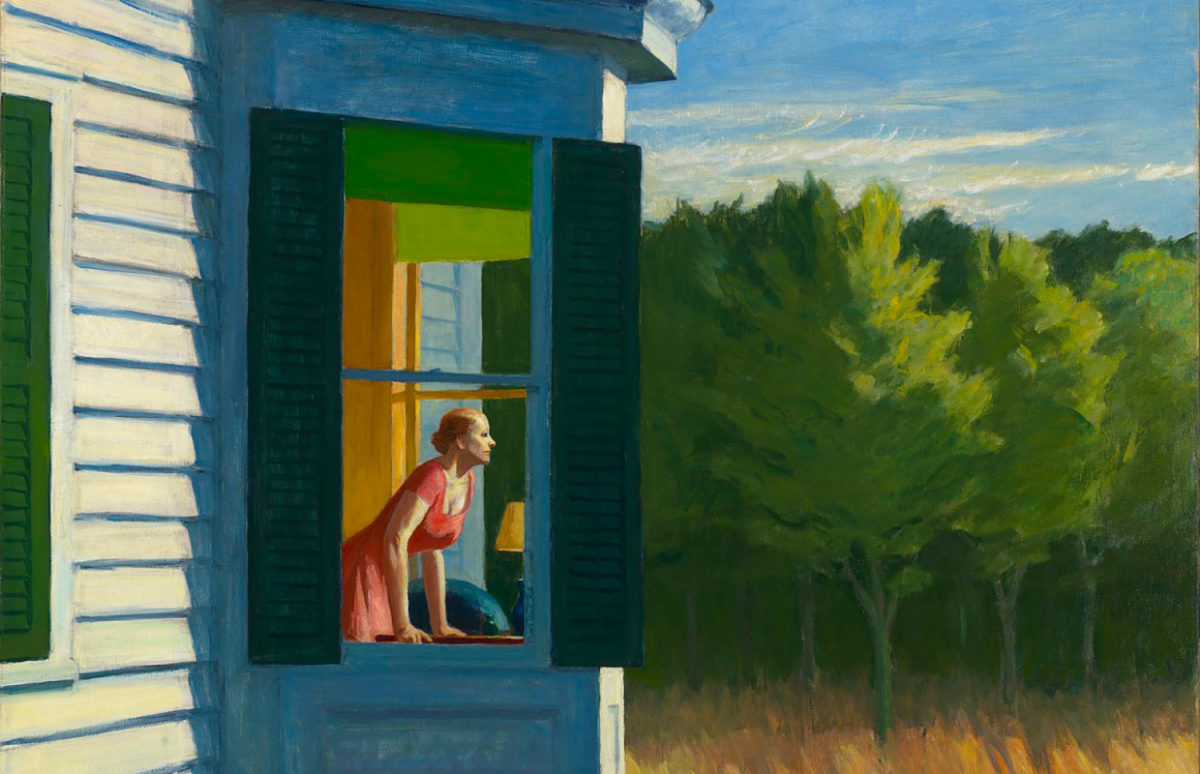We received thousands and thousands of fabulous entries to our Edward Hopper creative-writing contest. Here are our favourite B2-level texts.
And the winners are, in no particular order:
Adel from Mrs. Lesueur’s class, Europole, Grenoble
Tanguy from Mme Ledroit’s class, Institut Emmanuel d'Alzon, Nîmes
Damien from M. Thuillier’s class, Lycée Anguier, Eu
Claire from Mme Diaz’s class, Lycée Pierre du Terrail, Pontcharra
Mathéo from Mrs Longchamp’s class, Lycée René Cassin, Monfort-sur-Meu
Gwendal from Mme Droual’s class, Lycée Saint Louis, Châteaulin
Jade from Mme Godaillier’s class, Lycée Gaston Crampe, Aire sur l’Adour
Violette from Mrs Pheulpin’s class, Lycée Notre-Dame de Sion, Paris
Marion from Mme Boutet’s class, Lycée Jeanne d’Arc, Mazamet
Estelle, Manon and Juliette, Mme Muselle’s class, Lycée Blaise Pascal, Charbonnières
Scroll down to discover their amazing texts!
Adel from Mrs. Lesueur’s class, Europole, Grenoble
House by the Railroad, 1925
There was a house by the railroad in New York that was known for its mysterious reputation. It was said that the house was inhabited by an evil woman who had a treasure hidden beneath it. No one knew for sure what the treasure was or how the woman had come to possess it. One day, a young man named Jack decided to investigate the rumors for himself. He had always been drawn to adventure and the prospect of discovering a hidden treasure was too tempting to resist.
As he approached the house, he could feel a sense of foreboding wash over him. The windows were dark and the shutters were closed, giving the impression that the house was abandoned. But as he crept closer, he could see the faint glow of a light coming from inside. He cautiously made his way to the door and knocked, but there was no answer. Undeterred, he tried the handle and found that it was unlocked. He stepped inside and was immediately struck by the musty smell that filled the air.
As he explored the house, he found evidence of the evil woman’s presence everywhere. There were strange symbols etched into the walls and odd artifacts scattered throughout the rooms. He knew he had to find the treasure and get out of there as quickly as possible. Finally, after searching for what seemed like hours, he stumbled upon a secret door hidden behind a bookshelf. He pushed it open and descended a narrow staircase into a dark, underground chamber. And there, in the flickering light of a single candle, he found the treasure – a chest filled with gold and jewels. But as he reached for the chest, he heard a voice behind him. “You should have left well enough alone,” the evil woman hissed. Jack turned to face her, knowing that he was outnumbered and outmatched. He fled back up the staircase and out of the house as fast as he could, vowing never to return.
Tanguy from Mme Ledroit’s class, Institut Emmanuel D’Alzon, Nîmes
Railroad Sunset, 1929
The Song of Death
This is my last vision of freedom, just me and the sky, behind the gate that separates me from the outside world. Through the gate I see the watch tower of officers Smith James, behind it I see the sky. The light crosses the glass of the tower. The sky is wonderful, colors are really significant for me. In fact, the colors are red for passion, yellow for the joy of living and blue for appeasement. Clouds separate the shades of colors. I can hear the song that creates the night’s crickets in the fields opposite. 10 minutes later I will join it. I will die, for things I didn’t do. In fact, I’ve been locked up in this jail for maybe 8 years now. I lost the notion of time a long time ago. My mind is destroyed, 8 years of thinking if I’m finally mad. I’m not sure of what I did or didn’t do. 8 years is very long time behind the gate. I’m very nervous. To see their eyes looking for me. They think that I’m the murderer of their daughter. They were very innocent and so pretty. If only I hadn’t drunk so much on this night. I’m not saying that I killed them… or maybe I did it. I heard the guards approaching my cell without noise, because this silence is the song of death. I have to go now.
Damien from M.Thuillier’s class, Lycée Anguier, Eu
Office at Night, 1940
A special atmosphere reigned in the office that evening. Tension was almost palpable. Tracy felt it. Her boss had a serious face, he was frowning. She had left the heavy wooden door ajar to breathe better, not to feel confined in this sad room where the white walls contrasted with the dark furniture and floor. A ray of light from the street lamp provided some comforting warmth. As usual, Reece was dressed in a suit and tie with his perfectly polished shoes. Sitting at his desk, across from Tracy’s, he was holding a sheet of paper in his hand. His reading seemed to leave him upset and devastated. Tracy was curious at first and then, she started to worry. What did he hold so firmly in his hand? A telegram? A letter? Was he getting bad news? She would like to ask him, question him in order to help and support him. Yet, she remained speechless. Standing next to him, filing in the cupboard, she didn’t know how to react. She had been working with Reece for a long time but he still intimidated her so much. Reece had found this sheet of paper earlier, slipped into an envelope, under his office door, when Tracy was away. His name was inscribed on the envelope: Reece Smith. The thin contents of the sheet overwhelmed Reece with fear. Drops of sweat trickled from his forehead.
You are not who you say you are. I can prove that you are just an impostor.
No signing. An anonymous letter. Reece panicked.
Claire from Mme Diaz’s class, Lycée Pierre du Terrail, Pontcharra
Groundswell, 1939
Dear Friends
It was in the middle of summer break, and I had waited so long to see them all again. We had been planning this trip for several months, and we were finally there. The wind was blowing, and the boat was rolling on the waves. There was no one nearby. Not a sign of life. We were alone in this world, and none of us were talking. We were just standing there, looking at the ocean beyond our sight, under the warmth of the sun, happy to be gathered. And that’s when I realized.
This was it. The feeling I’ve been searching for my entire life. That feeling of well-being, and serenity when the world falls silent, and you finally feel at peace, surrounded by people who feel like home, people who pour an overflowing amount of courage and comfort into your heart. Taking a deep breath, I looked at them one by one, and noticing their placid faces, I couldn’t help but wonder how much longer this feeling I struggled to gain was going to last? Because that’s how humans behave. They change, they are never stable or constant. It’s not something we are capable of doing. I happen to know that all too well. Feelings come and go. Deep down, I like to imagine that in the end, it’s us, altogether, that this will last forever. But I can’t help thinking that they are just another lesson, people standing in the road of my life to teach me something. People I don’t get to keep. I am not second-guessing the power of our friendship, the bond that unites us, but I am afraid of losing everything. We have so much to lose in our lives, so many people who are just stopping by. So at this moment, on this boat, I raise my eyes to the sky, and I make my dearest wish. But it will always be us against the world. In this life, and the next…
Mathéo from Mrs Longchamp’s class, Lycée René Cassin, Monfort-sur-Meu
The Lighthouse at Two Lights, 1929
A mythical lighthouse on Cape Elizabeth built in 1787 contains stories about missing sailors and spirits. A young married couple, Emily and Frank set up in Portland Head in the 30’s. In this lonely lighthouse overlooking the sea, the couple had taken refuge. The old man had been sent to France during World War One in 1918. As he was a witness of shocking events he came back traumatized and quiet. Nobody talked to him for years except for his wife. Sometimes neighbours could see Emily in town shopping for some groceries but he didn’t go out anymore. Rumours quickly spread when the light, usually always on to guide ships, did not shine on a November morning. Some people were saying that the old Frank had died during another nightmare. Others were waiting for his wife in town to ask her what had happened and why the lighthouse was off. The crowd waited for days and days but neither Emily nor Frank went down to the village. The authorities decided to enter the building swept by the sea winds by forcing the door. The ships needed light to go along the coast. Two men had been chosen and the youngest one was quite frightened because of all the stories linked with this century old lighthouse. They entered the house and found nobody so they decided to climb to the top of the lighthouse despite their fright. Frank was sitting there silently, facing his wife’s dead body.

Gwendal from Mme Droual’s class, Lycée Saint Louis, Châteaulin
Soir bleu, 1914
Of course he won. He always wins. Why should he lose the game?
He is thirsty. He is always thirsty. Neither a glass carafe nor a sea of bourbon is enough for him. They are afraid of him. They can feel this grimm atmosphere.
They do not want to move and make him mad. What punishment will it be? He could burn her arm with his cigarette, break the chair or attack these mere clients.
Eat or be eaten. He knows this quote very well. He’s a predator and it is his territory.
He doesn’t know that I’m aware he’s cheating, but who cares?
He doesn’t know either that they are all wishing that he was dead. They hate him. She’s standing behind him, thinking of how she could break the glass carafe on his head. Their lives are ruled by his rules, terrible lives.
He’s always wearing white clothes but he’s no more than a devil man. Time goes by so slowly.
They don’t know that he’s going to leave because he has better things to do, that they will be all astonished in 2 minutes.
They don’t know either that he’s going to be hit by a car and there will be no white anymore, his red smile frozen forever.
Is it a coincidence? Who knows? For now, I just want to finish my cigarette.
Jade from Mme Godaillier’s class, Lycée Gaston Crampe, Aire sur l’Adour
Cape Cod Morning, 1950
On this Friday morning, Rosemary was looking outside the window of her house. She lived in the countryside, right next where her best friend Dorothy lived. Their parents where very close friends so she and Dorothy practically lived together. They did everything at the same time, even marrying. But there was a problem, they were in love with each other but never admitted it because of the fear of being rejected. They kept up their straight image to everyone. And married men.
Rosemary married a wealthy man, kind and caring on the outside, but an awful drinker and a violent man on the inside. Dorothy married a kind man who worked for the city newspaper. He was gay and knew Dorothy liked Rosemary. They were aware of each other’s sexuality and were some kind of best friends.
Every morning, Rosemary would look outside her window with the hope of seeing Dorothy. Dorothy would do the same, but in the evening. In the end, the two of them couldn’t admit their love until the last day of their life.
Violette from Mrs Pheulpin’s class, Lycée Notre-Dame de Sion, Paris
New York Movie, 1939
It took a while for me to come to her senses. She was aware of everything that was going on around her, yet she felt excluded from it. Neither the film nor the viewers were important to her. She was concentrating. Waiting for any sound she could hear. Trying to find causes for what was happening to her.
She remembered entering the room, sitting in one of the seats, putting her hand on the seat next to her in order to save a place for John, her husband, who had to join her after work.
But what she remembered most of all was the moment, just after the opening credits, when everything fell silent. She had thought it was just the film, but soon realized it was just her. Suddenly, for no reason, she had lost her hearing.
She had left the room in a panic and stood back, trying to calm the anxiety that was making her heartbeat faster. John was still not there.
Mary had never felt so alone, so alienated from her surroundings. However, it was no longer panic that she felt, but impatience. Her world had fallen silent, there was nothing left to do, but wait for John.
The movie night in New York was just meant to be relaxing.

Marion from Mme Boutet’s class, Lycée Jeanne d’Arc, Mazamet
Girl at a Sewing Machine, 1921
23rd of July 1921,
Dear diary,
I almost finished Abigail’s wedding dress; the event is in a couple weeks and I still need to adjust the size of the waistline and to add a few ornaments. She asked for blue tulle and the shop was out of stock, I will need to make the blue dye myself…
Perhaps with cornflowers? The blue will be subtle but this will do.
Abigail and her fiancé are such a lovely couple, the hopeless romantic I am can’t stop dreaming about meeting my white knight.
Talking about love, Alfred stopped by the house earlier, he wanted to make sure I wasn’t overworking myself and gave me a bouquet of white hyacinths, my favorite flowers! They have a wonderful myth around them about a pure love between a god and a human. I think he will propose to me soon! Maybe I will have my happy ending after all…
I’m going to go to sleep, I’ll update tomorrow evening.
Estelle, Manon and Juliette, Mme Muselle’s class, Lycée Blaise Pascal, Charbonnières
Summer Evening, 1947
On a summer evening, a couple is standing under the veranda, in front of their house.
The man has just learnt that, due to the economic crisis, the company he works at will have to fire some employees. He’s one of them and will have to leave the company which is based in a small rural town in the South of the USA. With not much work in this area, it’ll be difficult to find a new job there. Leaving the countryside for a large city with more job opportunities would be a solution. He’s okay with that but he has to convince his wife of the advantages it would bring.
But his wife is sad. She loves her current life, the little town where she has a lot of friends and relatives. Moving to a large city would mean she would lose everything. She would feel alone and unhappy.
The man explains that their life could be even nicer than their current life. The woman is perplexed, her world is crumbling. In fact, she’s torn between leaving the place where she evolved and lived all her life and the temptation to discover a new life, full of twists.
Copyright(s) :
Edward Hopper, Cape Cod Morning, 1950, oil on canvas, 86.7 x 102.3 cm, Smithsonian American Art Museum, Gift of the Sara Roby Foundation
Edward Hopper, Soir Bleu, 1914, Oil on canvas, 91.8 × 182.7 cm © Heirs of Josephine N. Hopper/Licensed by Artists Rights Society (ARS), New York
Edward Hopper, New York Movie, 1939. Oil on canvas, 32 1/4 × 40 1/8 in. (81.9 × 101.9 cm). The Museum of Modern Art; given anonymously. © 2022 Heirs of Josephine N. Hopper/Licensed by Artists Rights Society (ARS), New York. Image courtesy Art Resource
Tag(s) : "art" "creative writing" "Edward Hopper" "exhibition" "New York" "realism" "U.S. art" "U.S. culture" "U.S. history" "urban life"





